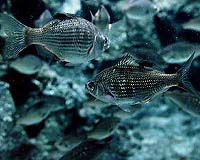| . |  |
. |
Vancouver (AFP) Oct 27, 2010 Researchers in Canada on Wednesday released the first scientific index designed to measure the impact of fish farming on the environment. Aquaculture has become increasingly controversial because of fears it can harm the environment and use up too many resources. Until now however, there has been no clear way to measure the environmental impact of the practice, said researcher John Volpe, from the University of Victoria, told AFP. Volpe said his "Global Aquaculture Performance Index" -- developed with help from the US-based Pew Environmental Group and funding from the American Lenfest Foundation -- is intended for use by "industry, farmers, bureaucrats, government ministers and other decision makers." The tool is similar to the "ecological footprint" concept used around the world to assess the overall impact of humans on the environment. Salmon farming in ocean pens already is controversial in North America because of concerns that farmed salmon spreads parasitic lice among already-threatened populations of wild salmon. But the index ranked other species of farmed fish as "far, far, worse," said Volpe. "Nearly anything coming out of Asia is problematic," he said, because of unregulated use of antibiotics, spread of parasites, and a greater use of wild species caught without regulations. "Some aquaculture production systems enable and facilitate unsustainable fisheries practices," he said, noting aquaculture has boomed in China especially over the past five years. The index measures the impact of fish farms according to 10 factors. These include the impact on the environment of capturing fish in the wild; the use of cleaning chemicals and antibiotics; the economic damage incurred when farmed fish escape into the wild; energy costs; and the impact on water oxygen levels. Volpe noted that sustainable foods are increasingly popular, as "eat local" and "slow food" movements flourishing in most developed countries. But sustainability, he said, is "hard enough to measure in terrestrial agriculture, where things are simpler." "Seafood is more complex. You're dealing with the most international, globalized foodstuff that humans consume," he said. "We hold seafood to a different standard -- a different level of ignorance," said Volpe.
Share This Article With Planet Earth
Related Links Water News - Science, Technology and Politics
 Pacific fisheries face collapse by 2035: study
Pacific fisheries face collapse by 2035: studyWellington (AFP) Oct 27, 2010 Pacific island fisheries face collapse in the next 25 years as overfishing, population growth and climate change threaten one of the region's main economic resources, a study warned Wednesday. The report, published by the Noumea-based Secretariat of the Pacific Community, said the two billion US dollar a year industry was poorly managed, with a lack of coordination between the 22 island nati ... read more |
|
| The content herein, unless otherwise known to be public domain, are Copyright 1995-2010 - SpaceDaily. AFP and UPI Wire Stories are copyright Agence France-Presse and United Press International. ESA Portal Reports are copyright European Space Agency. All NASA sourced material is public domain. Additional copyrights may apply in whole or part to other bona fide parties. Advertising does not imply endorsement,agreement or approval of any opinions, statements or information provided by SpaceDaily on any Web page published or hosted by SpaceDaily. Privacy Statement |